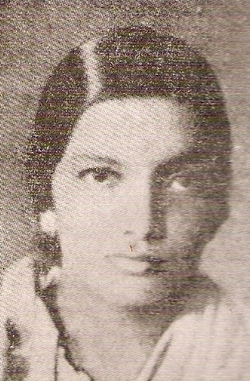Kalpana Dutta
Kalpana Dutta (কল্পনা দত্ত) | |
|---|---|
 | |
| Personal details | |
| Born | 27 July 1913 Sripur, Boalkhali Upazila, Chittagong District, Bengal Province, British India (now Bangladesh) |
| Died | 8 February 1995 (aged 81) Calcutta (now Kolkata), West Bengal, India |
| Nationality | Indian |
| Political party | Indian Republican Army, Chittagong branch From 1940 onwards, Communist Party of India |
| Profession | Indian independence movement activist, revolutionist |
Kalpana Datta (27 July 1913 – 8 February 1995) (later Kalpana Joshi) was an Indian independence movement activist and a member of the armed independence movement led by Surya Sen, which carried out the Chittagong armoury raid in 1930.[1] Later she joined the Communist Party of India and married Puran Chand Joshi, then General Secretary of the Communist Party of India in 1943.[2]
Early life[edit]
Kalpana Datta (also commonly spelt Dutta) was born in a Baidya family at Sripur,[3] a village of Chittagong District in the Bengal Province of British India (Sripur is now located in Boalkhali Upazila in Bangladesh). Her father Binod Behari Dattagupta was a government employee. After passing her matriculation examination in 1929 from Chittagong, she went to Calcutta and joined the Bethune College for graduation in Science. Soon, she joined the Chhatri Sangha (Women Students Association), a semi-revolutionary organisation in which Bina Das and Pritilata Waddedar were also active member's.[4]
Armed independence movement[edit]
The Chittagong armoury raid was carried out on 18 April 1930. Kalpana joined the "Indian Republican Army, Chattagram branch", the armed resistance group led by Surya Sen in May 1931. In September, 1931 Surya Sen entrusted her along with Pritilata Waddedar to attack the European Club in Chittagong. But a week before the attack, she was arrested while carrying out reconnaissance of the area. She went underground after her release on bail. On 16 February 1933 the police encircled their hiding place in Gairala village, and that raid Surya Sen was arrested but Kalpana was able to escape from there.
She was finally arrested on 19 May 1933. In the second supplementary trial of the Chittagong armoury raid case, Kalpana was sentenced to transportation for life. She was released in 1939.
Later life[edit]
Kalpana Datta graduated from the Calcutta University in 1940 and joined the Communist Party of India. She served as a relief worker during the 1943 Bengal famine and during the Partition of Bengal.[5] She wrote an autobiographical book in Bengali "চট্টগ্রাম অস্ত্রাগার আক্রমণকারীদের স্মৃতিকথা" which was translated into English by Arun Bose & Nikhil Chakraborty with a preface by Com. P. C. Joshi, a communist leader & her husband as "Chittagong Armoury Raiders: Reminiscences", published in English in October 1945.[6] In 1946, she contested in the elections for the Bengal Legislative Assembly as a Communist Party of India candidate from Chittagong but could not win.
Later, she joined the Indian Statistical Institute where she worked until her retirement. She died in Calcutta on 8 February 1995.[5]
Personal life[edit]
In 1943, she married the then General Secretary of the Communist Party of India, Puran Chand Joshi. They had two sons: Chand and Suraj. Chand Joshi (1946-2000) was a noted journalist, who worked for the Hindustan Times. He was also known for his work, Bhindranwale: Myth and Reality (1985). Chand's wife Manini (née Chatterjee) penned a book on the Chattagram armoury raid, titled, Do and Die: The Chattagram Uprising 1930-34.[7]
Artistic depictions[edit]
In 2010, Deepika Padukone starred as Kalpana Datta and Abhishek Bachchan starred as Suryja Sen, in a Hindi movie, Khelein Hum Jee Jaan Sey, which dealt with the Chittagong armoury raid and its aftermath. Another movie, Chittagong, was released on 12 October 2012, based on the uprising. It was produced and directed by Bedabrata Pain, an ex-NASA scientist.
Notes and references[edit]
- ↑ Chandra, Bipan and others (1998). India's Struggle for Independence, New Delhi: Penguin Books, ISBN 0-14-010781-9, p.253
- ↑ "Kalpana Joshi, 81; Struggled for India". The New York Times. 26 February 1995. Retrieved 19 May 2010.
- ↑ Sailesh Kumar Bandyopadhyay (2012), "Datta, Kalpana", in Sirajul Islam and Ahmed A. Jamal (ed.), Banglapedia: National Encyclopedia of Bangladesh (Second ed.), Asiatic Society of Bangladesh
- ↑ Jain, Simmi (2003). Encyclopaedia of Indian Women through the Ages. Vol. Vol.3. Delhi: Kalpaz Publications. p. 106. ISBN 81-7835-174-9.
{{cite book}}:|volume=has extra text (help) - ↑ 5.0 5.1 Nikhil Chakravartty, Kalpana Dutt's obituary in Mainstream, 18 February 1995.
- ↑ This book was reprinted in English in 1979. Its name in Bengali is চট্টগ্রাম অস্ত্রাগার আক্রমণকারীদের স্মৃতিকথা.
- ↑ "This above All". The Tribune. 5 February 2000. Retrieved 19 May 2010.
External links[edit]
- CS1 errors: extra text: volume
- Indian revolutionaries
- Communist Party of India politicians from West Bengal
- 1913 births
- 1995 deaths
- Bethune College alumni
- University of Calcutta alumni
- Women in West Bengal politics
- Women in war 1900–1945
- Indian women of World War II
- 20th-century Indian women politicians
- 20th-century Indian politicians
- Indian independence activists from West Bengal
- Women Indian independence activists
- Female politicians of the Communist Party of India